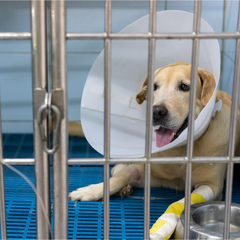
Choosing the right insurance for your dog

With so many different pet insurers on the market and policies that vary greatly, choosing the right dog insurance for your four-legged friend can be a bit of a minefield and seem like a daunting task. We took some time to carry out research to help you make the right decision when considering insurance for your dog.
The thought of our puppies and dogs becoming poorly or having an accident is never pleasant but unfortunately, as with humans, illness and injury are an inevitable occurrence for some dog owners.

Dog insurance offers us peace of mind that, in the unfortunate event that our dogs do fall ill or sustain an injury, financially we are covered, potentially saving us thousands upon thousands of pounds. Pet insurance helps us cover the high costs of veterinary treatment should our pooches need it. Many dog insurance providers also pay out if your pet passes away, is lost or stolen or causes damage to another party’s property.

We hope to explain how dog insurance works, what to look for and what is generally excluded from pet insurance policies:
Types of Policy
There are 4 main types of dog insurance policy:
- Accident only: provides cover for accidents only and no cover for illness
- Time-Limited: provides cover for a set amount of time (usually 12 months) and after this period the condition is excluded from the policy
- Maximum Benefit: provides cover up to a maximum amount of money per condition and once this limit is reached the condition is excluded from the policy
- Lifetime: provides a set amount of money each year which is refreshed each time you renew your policy allowing you to continue to claim for ongoing conditions regardless of how many times you’ve claimed
Accident only
This type of policy only covers injuries that your pet suffers by accident.
This is not be a suitable option if your pet develops health and medical issues, as treatment for illnesses is not covered.
Many pedigree dogs are susceptible to certain conditions based on their breed. If, for example, you had a French Bulldog that required BOAS (brachycephalic obstructive airway syndrome) surgery or a retriever with hip dysplasia, an accident only policy will not cover their treatment.
In our experience, we would strongly recommend against this type of cover.
Time limited policies
This type of policy lets you make claims for an agreed period of time, normally a year, for a certain condition.
At the end of the year you will not be able to make any further claims for a condition that has been treated. There is usually be a maximum claim limit too, for example £2,000. Once you’ve reached this threshold you will need to pay for any ongoing treatment as it won’t be covered by the policy.
This type of policy can protect against short and straightforward illnesses and is cheaper than higher levels of cover, but it will not cover long term or hereditary conditions that last several years.
We need to bear in mind that a limit of £2,000 does not go very far where veterinary bills are concerned. A CT scan alone can cost up to £900 and that is before we consider any treatment that is required, especially if the condition turns out to be something that needs ongoing treatment.
What you should also note is that, once a condition has been identified, it is classed as a pre-existing condition and therefore it is very unlikely that another insurer will cover it at any point.
Maximum benefit policies
Your dog will be covered for a condition up to a set monetary limit, for example £4,000. Once you have reached this limit you will not be able to make any further claims for the specific condition at any point in the future.
This offers more cover compared to a time limited policy, because you can claim for the same condition over several years, as long as you do not exceed the maximum claim limit.
This kind of policy will offer enough cover as long as the maximum claim limit is high enough to pay for all the treatment your pet might need during their whole life.
You should consider:
- Is the breed susceptible to any medical problems? If so, this type of policy is definitely not for you
- How much their treatment might cost, for example it could cost £1,000 each time your dog might need to be treated for a gastric condition
- Estimate how much it might cost to treat your pet during its lifetime. For example, if your dog develops a gastric condition that costs £1,000 to treat each time and they need this treated 5 times per year, it could cost £5,000 per year to treat them. Once you reach your limit you will be paying for each treatment yourself. Your limit does not renew annually. Once you reach it you will be responsible for paying for treatment.
Again, as with a time limited policy, you should also note is that once a condition has been identified, it is classed as a pre-existing condition and therefore it is very unlikely that another insurer will cover it at any point.
Whilst this type of policy does offer short term peace of mind, it is not comprehensive enough to cover your dog for life.
Lifetime policies
This is the most comprehensive of all dog insurance policies and offers a specific limit of cover that renews every year. If you have cover of £15,000 for vet fees, you will be able to claim up to this amount every single year of your dog’s life.
Lifetime policies are the most expensive option, but they offer the highest cover giving you complete peace of mind that financially, you are protected should the worst happen.
This is a good option for all animals that are susceptible to medical conditions or if you want to make sure that you have the best level of cover for your dog.
Routine and preventative care
Dog insurance only covers unexpected fees that arise from illness or injury. Treatments such as immunisations, spaying, castration, flea, worm and tick treatments, grooming, claw clipping and teeth maintenance are normally excluded from dog insurance policies.
Policies also generally exclude any expenses that arise due to pregnancy or whelping/giving birth
What are the alternatives to dog insurance?
Self-insurance
This involves saving a set amount of money per month to pay for potential vet bills. This is a risk as your vet bills could run into considerably more than you have saved if your pet suffers multiple illness or injury. For example, hip dysplasia, where your pet needs both hips replaced, could cost circa £8,000.
Charities and other help if you can’t afford pet insurance
In the UK, means tested support is available to those on low income, retired or those that receive certain state benefits. The charities that support this are the RSPCA, PDSA, SSPCA and USPCA. Please see their websites for further details.

Finding the best dog insurance policy
Once you have decided the level of cover that you would like to go for, it’s really important to shop around. Make sure you read the terms and conditions carefully, understand what you need to do should you need to make a claim and consider the excess you would need to pay should you make a claim. Some insurers pay your vet directly, meaning that you are not out of pocket at any point, others expect you to pay and be reimbursed by your chosen insurer. Levels of excess vary greatly.
Puppies that come from a breeder with free time limited cover
It is worth noting that if you take up a free initial cover period and your puppy develops a condition in this short space of time, you will be tied to this insurer as your dog will be classed as having a pre-existing condition and other insurers are unlikely to cover it. This normally means that your premiums will increase and you won’t be able to go elsewhere. It is always best to shop around ahead of getting your puppy to ensure that you are covered from the day that they are in your care.

In conclusion, for absolute peace of mind, we would always recommend choosing a lifetime policy with a high level of cover. This way, you are at the lowest risk financially and your dog will get the highest level of care in the unfortunate event that they need it. We encourage you to make use of the many insurance comparison sites online to decide the best insurer for you and your beloved pup.











